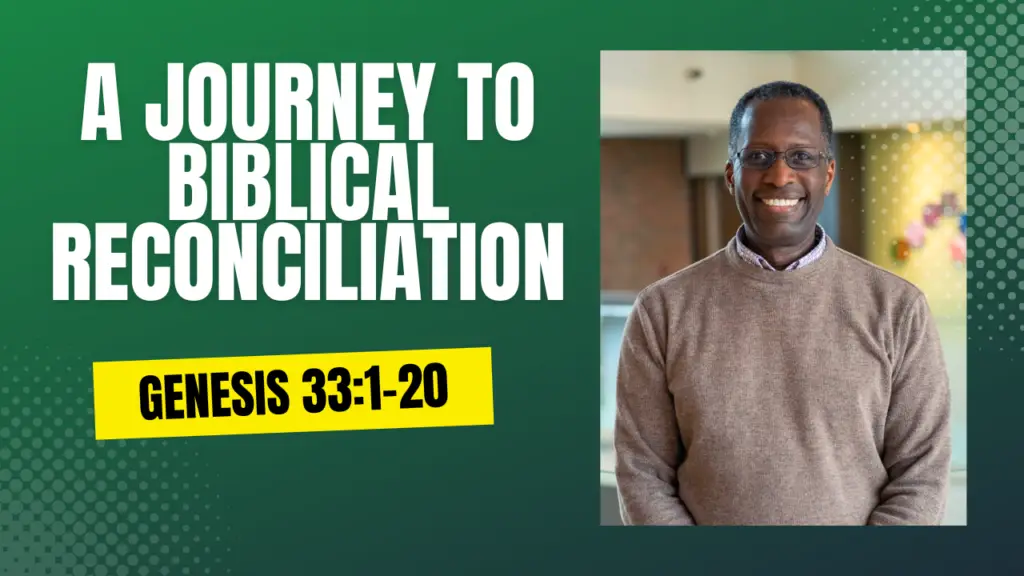Jacob and Esau: A Journey of Reconciliation
Introduction
In our lives, we all experience broken relationships, whether with family, friends, or colleagues. These unresolved conflicts can linger for years, creating deep wounds and a sense of hopelessness. However, the Bible offers a message of hope and reconciliation through the gospel of Jesus Christ. This sermon explores the powerful story of Jacob and Esau in Genesis 33, illustrating how God can transform broken relationships and bring about true peace.
The Reality of Broken Relationships
We live in a world filled with anger, division, and bitterness. The drive for what is right often overwhelms our desire to listen, forgive, and reconcile. Many of us have relationships that are severed, whether due to betrayal, misunderstanding, or deep-seated pain. The story of Jacob and Esau shows us that reconciliation is possible, even in the most unlikely circumstances.
The Story of Jacob and Esau
Conflict from the Beginning
The conflict between Jacob and Esau began even before they were born. In Genesis 25, we see them struggling in their mother Rebekah’s womb. This conflict continued throughout their lives, with Jacob swindling Esau out of his birthright and blessing. Esau’s anger and bitterness led him to vow to kill Jacob, forcing Jacob to flee for his life.
The Journey to Reconciliation
Reconciliation is often a journey that takes time. For Jacob and Esau, it took decades for God to work in their hearts and prepare them for reconciliation. Jacob, the deceiver, was humbled through his experiences, including being deceived by his father-in-law and wrestling with God. This transformation allowed him to approach Esau with humility and seek forgiveness.
The Encounter
In Genesis 33, Jacob and Esau finally meet after years of estrangement. Jacob, now humbled, bows down to Esau, showing complete submission. To his surprise, Esau runs to meet him, embraces him, and weeps. This emotional reunion demonstrates the power of God’s work in their lives, bringing about true reconciliation.
Lessons from the Story
Humility and Repentance
True repentance goes beyond words. Jacob’s actions, including bowing down and offering gifts, show his genuine humility and desire to make amends. This story reminds us that reconciliation requires us to humble ourselves and seek forgiveness, both from God and from those we have wronged.
God’s Role in Reconciliation
God is the ultimate reconciler. Just as He worked in Jacob and Esau’s hearts, He works in our lives to bring about reconciliation. Romans 5:10 tells us that while we were enemies, we were reconciled to God through the death of His Son. This spiritual reality underscores the importance of seeking reconciliation with God and others.
The Ministry of Reconciliation
As believers, we are called to be ambassadors of reconciliation. 2 Corinthians 5:18-20 emphasizes that God has entrusted us with the message of reconciliation. We are to share the hope and peace found in Jesus Christ with a world in desperate need of it.
Life Application
Challenge for the Week
Reflect on your relationships. Is there someone you are estranged from? Consider taking steps towards reconciliation, just as Jacob did. Humble yourself, seek forgiveness, and trust in God’s power to transform hearts.
Questions to Ponder
1. Is there a relationship in your life that needs reconciliation?
2. Are you willing to humble yourself and seek forgiveness?
3. How can you be an ambassador of reconciliation in your community?
Conclusion
The story of Jacob and Esau teaches us that reconciliation is possible through God’s transformative power. As we seek to reconcile with others, let us also remember the ultimate reconciliation we have with God through Jesus Christ. Embrace the ministry of reconciliation and be a light to those in darkness, offering hope and peace in a broken world.
Take the Next Step on Your Journey
Thank you for joining me today. If you found this lesson helpful, I encourage you to explore more resources and support on my website, https://jameslongjr.org/.
Finally, would you consider joining our Lessons for Life monthly membership or our online group coaching, where you’ll find powerful coaching videos, a supportive community, and step-by-step guidance for lasting transformation?
Remember, true change is possible when you walk in God’s grace and for His glory. Until next time, may you find peace, hope, and joy in Christ alone. Blessings!


